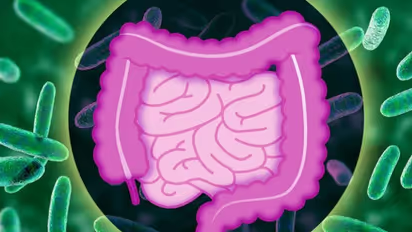Do you have an unhealthy gut? Here are 7 common signs and tips to address them

Synopsis
Many of us have had gastrointestinal problems at some point. Here are several signs of a sick gut, ranging from mild digestive issues to more severe conditions.
The term ‘gut’ refers to the intestines, including the small and large intestines. The small intestine is essential for digestion and absorbing vital nutrients, while the large intestine is key for water and electrolyte absorption. Many of us have encountered gut-related issues at some point. Here are some symptoms that indicate an unhealthy gut, ranging from minor digestive disturbances to more serious conditions:
1. Abdominal Pain: Persistent or recurrent abdominal pain, especially cramping or sharp pain, can indicate issues like irritable bowel syndrome (IBS), inflammatory bowel disease (IBD), intestinal infections, or even intestinal cancers.
2. Changes in Bowel Habits: Significant changes in bowel movements, such as diarrhoea, constipation, alternating between the two, or blood in the stool, may suggest underlying intestinal issues. This includes difficulty passing stools or urgency.
3. Bloating and Gas: Excessive gas and bloating after meals, particularly when accompanied by discomfort or pain, can indicate problems with digestion or lactose intolerance.
Also Read: World Brain Day 2024: 7 ways to boost your memory
4. Unexplained Weight Loss: Significant, unintentional weight loss without changes in diet or exercise could be a sign of malabsorption issues, chronic inflammation in the intestines, or cancer.
5. Nausea and Vomiting: Frequent nausea and vomiting can indicate underlying gastrointestinal problems.
6. Fever: Fever accompanied by other gastrointestinal symptoms, like diarrhoea or abdominal pain, could indicate gastroenteritis or intestine inflammation.
7. Persistent Heartburn or Indigestion: Chronic heartburn, acid reflux, or indigestion could point to gastroesophageal reflux disease (GERD) or other gastrointestinal issues.
Also Read: EXPLAINED: What is Grey Divorce? What factors does it depend upon?
If you experience any of these symptoms persistently or if they worsen over time, it's important to seek medical advice promptly. In our society, abdominal problems are often dismissed as ‘gas,’ and timely medical attention is not sought. A doctor can perform necessary tests and evaluations to determine the underlying cause and recommend appropriate treatment. Early detection and management of intestinal problems can significantly improve outcomes and quality of life.
- Dr. Vidya Bhat, Surgical Gastroenterology, KMC Hospital, Mangalore
Explore the latest Lifestyle News covering fashion, wellness, travel, Food and Recipes, and more. Stay updated with trending Health News, fitness tips, and expert insights to inspire your daily living. Discover personalized lifestyle trends that keep you stylish and informed. Download the Asianet News Official App from the Android Play Store and iPhone App Store for everything that adds value to your everyday life.